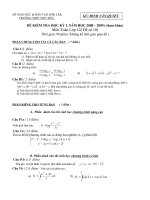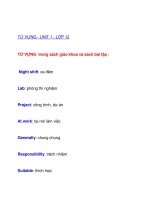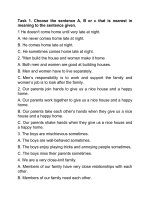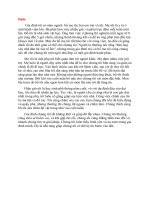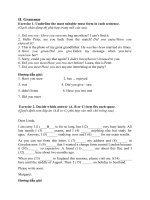unit 1- lop 12
Bạn đang xem bản rút gọn của tài liệu. Xem và tải ngay bản đầy đủ của tài liệu tại đây (118.33 KB, 5 trang )
UNIT 1: HOME LIFE
PRACTICE TEST 1
I. Pick out the word whose underlined part is pronounced differently from that of the others.
1. A. parents B. enjoys C. boys D. speeds
2. A. nurses B. watches C. chores D. dishes
3. A. photographs B. speaks C. soups D. sometimes
4. A. weekends B. works C. always D. feelings
5. A. hours B. students C. brothers D. hospitals
II. Pick out the word that has the stress pattern different from that of the others.
6. A. family B. father C. brother D. believe
7. A. generally B. biologist C. mischievous D. secondary
8. A. obedient B. hospital C. possible D. confidence
9. A. together B. relationship C. responsibility D. whenever
10. A. suitable B. solution C. confidence D. interest
I. Choose the most suitable word or phrase (A, B, C or D) to complete each sentence.
11. I was born in Scotland but I __________ in Northern Ireland.
A. grew up B. raised C. brought up D. rose
12. When Henry arrived home after a hard day at work, __________
A. his wife was sleeping B. his wife has slept C. his wife slept D. his wife has been sleeping
13. Edward was named after one of his father's distant __________
A. family B. brothers C. members D. relations
14. You can't tell what someone is like just from their __________
A. character B. appearance C. personality D. looking
15. I __________ here for hours and I feel tired.
A. am standing B. was standing C. have been standing D. stood
16. Julie had a terrible __________ with her parents last night.
A. row B. discussion C. argue D. dispute
17. I got to __________ Steve well last year when we worked together.
A. introduce B. know C. meet D. sympathise
18. Last week I __________ my scarf, and now I __________ my gloves.
A. lost - just lost B. lost - have just lost C. had lost -just lost D. lost - am just losing
19. Parents have to try hard to understand the younger __________
A. generation B. people C. adolescents D. teenagers
20. Helen never does the housework. She is rather __________
A. lazy B. reliable C. gentle D. hard-working
21. __________ have long hair when you were younger?
A. Used you to B. Did you use to C. Have you used to D. A or B
22. Teresa never gets angry with the children. She is very __________
A. brave B. pleasant C. patient D. generous
23. I went out into the garden to fetch nay bike, but __________ that someone __________ it.
A. found - had stolen B. was finding – stole C. found - stole D. was finding - had stolen
24. My mother takes the __________ for running the household.
A. task B. duty C. responsibility D. ability
25. She described her boss __________ a very unpleasant person.
A. like B. as if C. such as D. as
II. Choose the underlined part among A, B, C or D that needs correcting.
26. (A) The food that Mark (B) is cooking in the kitchen (C) is smelling (D) delicious.
27. After George (A) had returned (B) to his house, he (C) was reading (D) a book.
28. Certain bats (A) used their own sound (B) to locate food and (C) to avoid obstacles (D) as they fly at night.
29. I (A) live in the same town (B) all my life and I do not want (C) to move to another (D) one .
30. (A) Although it (B) raining heavily, he (C) went out (D) without a raincoat.
III. Choose the correct sentence among A, B, C or D which has the same meaning as the given one.
31. Michael took a deep breath and dived into the water.
A. After Michael had taken a deep breath, he dived into the water.
B. Having taken a deep breath, Michael dived into the water.
C. After Michael took a deep breath, he had. dived into the water.
D. A & B are correct.
32. We started working here three years ago.
A. We worked here for three years. B. We have no longer worked here for three years.
C. We have worked here for three years. D. We will work here in three years.
33. It is a long time since we last went to the cinema.
A. We have been to the cinema for a long time. B. We haven't been to the cinema for a long time.
C. We don't go to the cinema as we used to. D. We wish we went to the cinema now.
34. I haven't finished reading this book yet.
A. I’m still reading this book. B. I have read this book before.
C. The book I'm reading hasn't finished. D. I will read this book some day.
35. I predict a victory for our team
A. I think our team will win. B. The victory is definitely in our hands.
C. I'm sure our team is going to win. D. I have no doubt that our team will win the victory.
C. READING
I. Read the passage below and decide which answer (A, B, C or D) best fits each space.
BRINGING UP A FAMILY
It can be so difficult to support a family and bring up children, says Michael Wilson, father of two teenage girls.
It's something that (36) can ever prepare you for because every family (37) of different people and personalities.
Firstly, you have to make sure that everyone has what they (38) . Children require so many things these from
school uniforms and books, pens and pencils to games, toys, computers and, of course, clothes. Secondly,
there is ,always the concern that they might be in danger. I(39) so many terrible things on the news everyday that I
always wonder whether my own children are safe or (40) and sometimes I get very concerned, even if they are
only a little late (41) home. That's what they don't (42) when I tell them off.
Of course, there are wonderful aspects to (43) a family. It is a great pleasure to (44) them grow and develop their
own personalities, not to mention the love and warmth that exists in a family. My wife and children
are the most precious things in my life and, (45) the difficulties, I can honestly say that I couldn't change a thing!
36. A. nobody B. somebody C. one D. they
37. A. includes B. consists C. has D. contains
38. A. need B. ask C. wish D. request
39. A. listen B. look C. watch D. see
40. A. so B. no C. not D. what
41. A. reaching B. going C. coming D. making
42. A. think B. imagine C. wonder D. understand
43. A. having B. growing C. bringing D. rising
44. A. look B. watch C. glimpse D. stare
45. A. however B. in spite C. despite D. although
II. Read the passage below and choose the best answer (A, B, C or .D) to each question.
When I was younger, I hated being the oldest child and the only girl in my family. But now I am older, I realize
that being 'Big Sister' actually has its advantages. First of all, I get special treatment from my parents and brothers.
I get my on room, and brothers have to do all the heavy work around the house. Another benefit is that, being the
oldest, I have learned to be responsible and dependable. For example, my parents often leave my brothers in my
care when they go out. I also try my best in whatever I do in order to be a good example for my brothers. The
experience I've had in taking care of my brothers has prepared me for my own family in the future. So, even
though I didn't choose to be the oldest child and the only girl in my family, I have succeeded in making this
situation work to my best advantage.
46. The writer disliked __________when she was younger.
A. having too many brothers in her family
B. being the oldest child and the only girl in her family
C. being the only child in her family
D. getting special treatment from her parents and brothers
47. 'Big Sister' means ___________
A. the only child B. the biggest sister C. the eldest sister D. the oldest person
48. She has to __________ when her parents go out.
A. look after her brothers B. cook every meal
C. do heavy work around the house D. lay the table for dinners
49. She has __________ in making the situation work to her best advantage.
A. liked B. failed C. chosen D. succeeded
50. When the writer grows up, she finds it is __________ to be a big sister.
A. boring B. enjoyable C. unacceptable D. miserable
PRACTICE TEST 2
A. PHONETICS
I. Pick out the word whose underlined part is pronounced differently from that of the others.
1. A. tasks B. sisters C. books D. biologists
2. A. houses B. rushes C. goes D. watches
3. A. nights B. markets C. talks D. things
4. A. solutions B. hands C. schools D. knits
5. A. hurries B. nurses C. dishes D. washes
II. Pick out the word that has the stress pattern different from that of the others.
6. A. household B. behave C. daughter D. children
7. A. attempt B. secure C. member D. collect
8. A. decision B. important C. another D. personal
9. A. football B. support C. happy D. member
10. A. supportive B. different C. motorbike D. anyway
B. VOCABULARY AND STRUCTURE
I. Choose the most suitable word or phrase (A, B, C or D) to complete each sentence.
11. Emily __________ off the bus, and __________ into the bank.
A. got - walked B. was getting - was walking
C. got - was walking D. was getting – walked
12. Penny-never does anything silly. She's very __________
A. sensible B. sensitive C. logical D. senseless
13. All Sue's friends and __________ came to her party.
A. relations B. relatives C. relationship D. A or B
14. When you __________ over the cliff, what __________ next?
A. fell - happened B. were falling – happened C. fell - was happening D. fell - had happened
15. In an ideal marriage, husband and wife __________ each other's problems.
A. have B. divide C. share D. take
16. __________ the fighting stopped, travel across country has been quite safe.
A. When B. After which C. Since D. Unless
l7. __________ that men make house and women make home
A. To believe generally B. It is generally believed C. Believing generally D. The general belief
18. That can't be right! I __________ it!
A. am not believing B. won't be believing C. don't believe D. am not going to believe
19. __________ most men, my father enjoys cooking very much.
A. Unlike B. Not like C. Dislike D. Likewise
20. She is the first student __________ in the assignment.
A. handing B. to hand C. who hand D. hands
21. She was a devoted nurse, always very __________ to the needs of her elderly patients.
A. careful B. observant C. earnest D. attentive
22. The passengers are tired because they __________ all night.
A. don't sleep B. haven't slept C. wasn't sleeping D. not sleep
23. I __________ very well with my father now; we never have any arguments.
A. go on B. carry on C. get on D. put on
24. Mrs Carter __________ her son for getting dirty.
A. told off B. put down C. brought up D. took on
25. David __________ he __________ her somewhere before.
A. knew - had seen B. had known - had seen C. had known - saw D. knew — saw
Choose the underlined part among A, B, C or D that needs correcting.
26. When I (A) was a child, I (B) was riding (C) a tricycle (D) to school.
27. I can't (A) come out (B) because I (C) didn't finish my homework (D) yet.
28. (A) We'd better (B) wait here (C) until the rain (D) will stop.
29. (A) When the film (B) started, I (C) already arrived ten minutes (D) before.
30. (A) While Mary (B) washed-up, she (C) broke (D) a cup.
Choose the one option (A, B, C or D) corresponding to the best sentence that is made up from the sets of
words and phrases given.
31. Terry / intend / finish /paint / kitchen / this evening
A. Terry intends to finish painting the kitchen this evening.
B. Terry is intending to finish painting the kitchen this evening.
C. Terry intends to finish to paint the kitchen this evening.
D. Terry is intending to finish to paint the kitchen this evening.
32. Luis/ live / city centre / since 1996
A. Luis lived in the city centre since 1996. B. Luis has lived in the city centre since 1996.
C. Luis was living in the city centre since 1996. D. Luis is living in the city centre since 1996.
33. This /be /first time /I/be / a plane
A. This is the first time I am on a plane. B. This is the first time I will be on a plane.
C. This is the first time I have been on a plane. D. This is the first time I was on a plane.
34. I / see /friend/you / moments / ago
A. I see a friend of yours a few moments ago. B. I saw a friend of yours a few moments ago.
C. I have seen a friend of yours a few moments ago. D. I saw a friend of you a few moments ago.
35. What /you /do / when / I /phone you / last night
A. What are you doing when I phone you last night? B. What did you do when I had phoned you last night?
C. What did you do when I phoned you last night? D. What were you doing when I phoned you last night?
C. READING
I. Read the passage below and decide which answer (A, B, C or D) best fits each space.
GROWING FAMILY
My mother and father (36) divorced about ten years ago. Six years later, my mother met a kind and (37) man
called Tom and she (38) . He had two sons from his previous marriage, Michael and Harry, who are now my (39)
brothers. They (40) to live with their mother, but now we live together in an enormous house that Tom bought
and we are quite a (41) family. It's nice having brothers to play with because otherwise I would have been an / a
(42) child. My father lives with a woman called Sarah. She is a very (43) and friendly person and I really like her.
She and my father are thinking of (44) a child. The problem is that Sarah works for an airline so she is always
flying around the world and sometimes she is away from home for a whole week . She says that she is not very
(45) and that she might stop working to look after a baby.
36. A. made B. had C. got D. went
37. A. arrogant B. pessimistic C. considerate D. impolite
38. A. united B. remarried C. related D. married
39. A. step B. half C. only D. second
40. A. would B. use C. used D. should
41. A. generous B. arrogant C. loving D. sensitive
42. A. only B single C. one D. step
43. A. cold B. hot C. icy D. warm
44. A. taking B. adopting C. assuming D. accepting
45. A. generous B. optimistic C. ambitious D. selfish
II. Read the passage below and choose the best answer (A, B, C or D) to each question.
SIBLINGS
When we are children, our sibling - that is, our brothers and sisters - are our first friends and first enemies. At the
end of life, they are often our oldest friends and oldest enemies. The effect of sibling relationships in childhood
can last a lifetime. Many experts say that the relationship among brothers and sisters explains a great deal about
family life, especially today when brothers and sisters often spend more time with one another than with their
parents.
Studies have shown that sibling relationships between sister-sister pairs and brother-brother pairs are different.
Sister pairs are the closest. Brothers are the most competitive. Sisters are usually more supportive of each other.
They are more talkative, frank, and better at expressing themselves and sharing their feelings. On the other hand,
brothers are usually more competitive with each other.
Experts agree that the relationship among siblings is influenced by many factors. For example, studies have shown
that both brothers and sisters become more competitive and aggressive when their parents treat them even a little
bit differently from one another. But parental treatment is not the only factor. Genetics, gender, life events, people,
and experiences outside the family all shape the lives of siblings. Recently, one researcher demonstrated another
factor: in sibling relationships. It was discovered that children dislike watching their siblings fight. In fact, they
respond to arguments by taking sides -supporting one sibling and punishing the other.
46. What is the main idea of the first paragraph?
A. Siblings are our oldest friends in life.
B. Siblings are our oldest enemies in life.
C. Sibling relationships are among the most important relationships in life.
D. Some siblings have good relationships, but other siblings have bad relationships.
47. What is the main idea of the second paragraph?
A. Sisters get along better with their sisters than with their brothers.
B. Females and males generally have different sibling relationships.
C. Siblings spend a lot of time together because they have to.
D. Brothers usually tend to be competitive with sisters.
48. What is the main idea of the third paragraph?
A. There are many causes of good and bad sibling relationships.
B. Research has shown that siblings hate to fight.
C. Siblings often support or punish one of their brothers or sisters in an argument.
D. Siblings are often indifferent to their parental treatment.
49. Which of the following is NOT true about siblings?
A. Sibling relationships between sister-sister pairs and, brother-brother pairs are different.
B. Brother-brother pairs are the most competitive.
C. Sister-sister pairs are the closest.
D. Brothers are more talkative than sisters.
50. Which of the following is true about siblings?
A. Children avoid arguments that their siblings have.
B. The relationship among brothers and sisters-explains a lot about family life.
C. Parental treatment is the only factor that influences the, relationships among siblings.
D. Genetics and gender don't impact on the lives of siblings.

